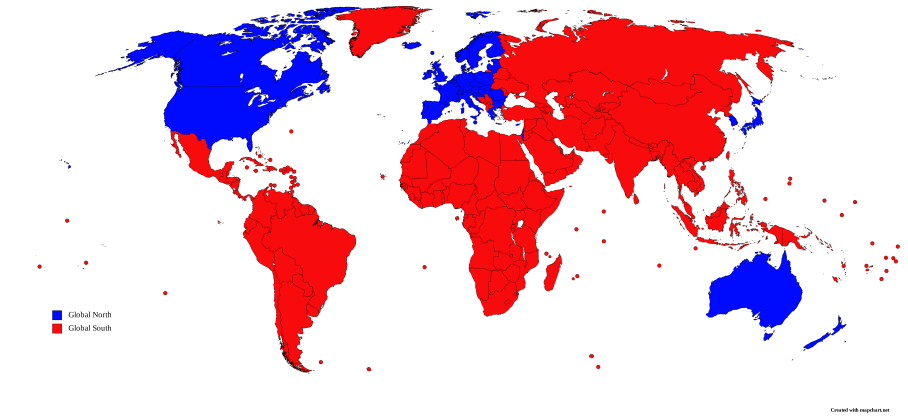Jucheguevara (talk | contribs) No edit summary Tag: Visual edit |
m (Added a blue link to dependency page, improved reference formatting and improved wording in the first paragraph) Tag: Visual edit |
||
| Line 1: | Line 1: | ||
[[File:1920px-North South divide.svg.png|thumb|Global North is in blue, Global South is in red]] | [[File:1920px-North South divide.svg.png|thumb|Global North is in blue, Global South is in red]] | ||
In geopolitics, the '''Global South''' (sometimes abbreviated to '''GS''') is a general term that roughly designates the | In geopolitics, the '''Global South''' (sometimes abbreviated to '''GS''') is a general term that roughly designates the economically exploited capitalist economies, in contrast, the '''Global North''' ('''GN''') are the most advanced capitalist countries,<ref>IGI Global Publisher Dictionary, "[https://www.igi-global.com/dictionary/global-northsouth/50101 What is Global North/South?]"</ref> whose wealth was largely generated from their [[Colonialism|colonial]] pasts and their modern involvement in [[imperialism]].<ref name=":0">LENIN; Vladimir, Imperialism: The Highest Stage of Capitalism ([https://www.marxists.org/archive/lenin/works/1916/imp-hsc/ Read on Marxists.org])</ref> | ||
It's important to note that as this is a geopolitical term, some leeway must be accounted for. For example, [[People's Republic of China|China]] is generally considered by financial institutions to be part of the South, despite them soon achieving the highest GDP in the world. [[Israel]] is considered to be part of the Global North, due to its close relationship with and its strategic importance to the Global North ex-colonial powers.<ref>Maps of the World, [https://www.mapsofworld.com/answers/regions/division-global-north-global-south/ What is the division between the Global North and the Global South?]</ref> | It's important to note that as this is a geopolitical term, some leeway must be accounted for. For example, [[People's Republic of China|China]] is generally considered by financial institutions to be part of the South, despite them soon achieving the highest GDP in the world. [[Israel]] is considered to be part of the Global North, due to its close relationship with and its strategic importance to the Global North ex-colonial powers.<ref>Maps of the World, [https://www.mapsofworld.com/answers/regions/division-global-north-global-south/ What is the division between the Global North and the Global South?]</ref> | ||
The term Third-World is a disambiguation; it | The term Third-World is a disambiguation; it referred to underdeveloped capitalist countries which were not totally aligned with either bloc during the [[Cold War]].<ref>World of Education; First. Second and Third World ([https://mundoeducacao.uol.com.br/geografia/primeiro-segundo-terceiro-mundo.htm In Portuguese])</ref> The term "developing countries" is partially misleading, as it ignores the fact that their development is impeded by already developed countries that either maintain them as client states or make them [[Dependency|economically dependent]] on export/imports from the rich parts of the world.<ref name=":0" /> | ||
== References == | == References == | ||
Revision as of 20:49, 23 August 2021

In geopolitics, the Global South (sometimes abbreviated to GS) is a general term that roughly designates the economically exploited capitalist economies, in contrast, the Global North (GN) are the most advanced capitalist countries,[1] whose wealth was largely generated from their colonial pasts and their modern involvement in imperialism.[2]
It's important to note that as this is a geopolitical term, some leeway must be accounted for. For example, China is generally considered by financial institutions to be part of the South, despite them soon achieving the highest GDP in the world. Israel is considered to be part of the Global North, due to its close relationship with and its strategic importance to the Global North ex-colonial powers.[3]
The term Third-World is a disambiguation; it referred to underdeveloped capitalist countries which were not totally aligned with either bloc during the Cold War.[4] The term "developing countries" is partially misleading, as it ignores the fact that their development is impeded by already developed countries that either maintain them as client states or make them economically dependent on export/imports from the rich parts of the world.[2]
References
- ↑ IGI Global Publisher Dictionary, "What is Global North/South?"
- ↑ 2.0 2.1 LENIN; Vladimir, Imperialism: The Highest Stage of Capitalism (Read on Marxists.org)
- ↑ Maps of the World, What is the division between the Global North and the Global South?
- ↑ World of Education; First. Second and Third World (In Portuguese)